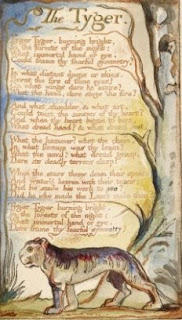 William Blake was so many creators: poet, engraver, painter, mystic, prophet. You probably know the great poem "Tyger, tyger, burning bright" from Songs of Experience. Here you can see the poem not just in its printed version, as we probably learned it in high school, but in one of its original magnificently colored and intricately lettered forms. I just saw this at the J. P. Morgan Library and Museum in New York, where there's a wonderful exhibit of Blake's original prints and paintings, images that are amazing in the original.
William Blake was so many creators: poet, engraver, painter, mystic, prophet. You probably know the great poem "Tyger, tyger, burning bright" from Songs of Experience. Here you can see the poem not just in its printed version, as we probably learned it in high school, but in one of its original magnificently colored and intricately lettered forms. I just saw this at the J. P. Morgan Library and Museum in New York, where there's a wonderful exhibit of Blake's original prints and paintings, images that are amazing in the original.What a strange poem this "Tyger" is: contemplating creation as the work of a blacksmith at his anvil, hammering iron to create the sinews of a great tiger. That tiger is surely the French Revolution, striking terror and hope into Europe as Blake was creating these poems. It is also the poem/print itself, etched into copper with acid as biting as the rhetoric of Revolution and Terror. And yet -- how doubly strange -- this tiger is depicted as no fiercer than my cat. It is easy to forget how these poems of "Experience" -- bitterness, struggle, sometimes despair -- were paired by Blake with his lovely, pastoral "Songs of Innocence": "Little Lamb, who made thee?" The tiger and lamb may be, as he said, "contraries," but they are inextricably bound to each other.
 This image is "Job Rebuked by his Friends." For Blake, the bible was a series of poems, texts he read not for fundamentalist truths, but as windows into the strange workings of the spirit. Here is Job, covered in boils, having lost his wealth and family, in misery, all because of Satan's dare to God: let me test your righteous servant, he proposes, and God agrees.
This image is "Job Rebuked by his Friends." For Blake, the bible was a series of poems, texts he read not for fundamentalist truths, but as windows into the strange workings of the spirit. Here is Job, covered in boils, having lost his wealth and family, in misery, all because of Satan's dare to God: let me test your righteous servant, he proposes, and God agrees.Here Job is visited by his "friends," who assert that he must be a sinner: God only punishes those who break His commandments. These friends are hateful figures of accusation, terrible, and terribly wrong: Job is righteous.
And yet these rebukers are beautiful, powerfully expressive (look at those hands!), and in some ways they are right. Job's righteousness has blinded him in some way; it has in itself been his failure. As Blake read the book, Job worships a God he has essentially created out of his own soul: a God who is like him, righteous, exacting, strict to the law. He needs to be awakened to a different divinity (a lamb?), and these horrible accusers (these tigers?) are doing just that. It's a revolutionary reading of that great book of the bible. There are 22 prints in all in the Job series, each a miniature masterpiece.
For a wonderful novel about Blake in his London and revolutionary contexts, I recommend Tracy Chevalier's Burning Bright. The exhibition is William Blake's World: "A New Heaven Is Begun" and it is on until Jan. 3.